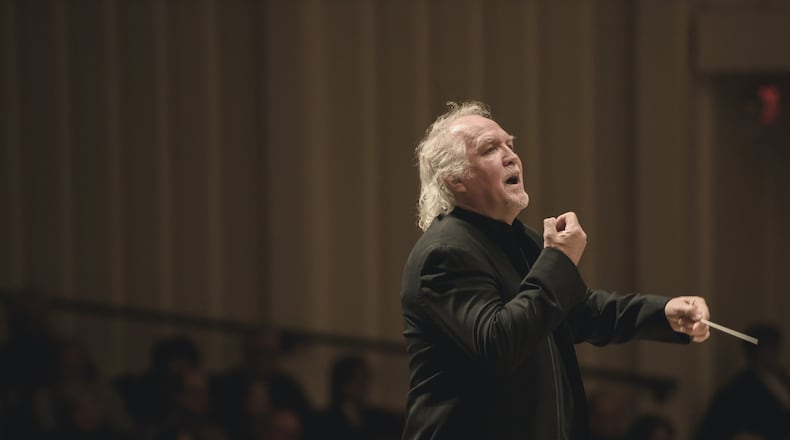Claude Debussy’s “La Puerta del Vino,” a solo piano piece from Book 2 of “Preludes,” is a pointillist piano score that calls for the performer to peck out a disjunct introduction before moving briefly into a skipping bass line. Splashy chords interject and interrupt, impressionistic phrases give way to subtle aggression. The whole thing can be a bit disorienting.
On Thursday at Symphony Hall, the Atlanta Symphony Orchestra, under the baton of principal guest conductor Donald Runnicles, viewed these piano etudes through a different lens – and without a piano in use. Using British composer and musicologist Colin Matthews’ orchestral transcriptions as a guide, the full orchestration provides a new entry to the composition with Debussy’s piano work forming the base. The jabbed piano notes of the introduction to “La Puerta” transformed into a thundering bass line played by horns, percussion and strings. The expanded color palette lent the passage more gravity; a solo flute melody emerging, hesitantly, from the introduction, transformed Matthews’ orchestration into a brilliant reimaging of a cherished piano work.
In addition to “La Puerta,” Runnicles and the ASO performed three more of Matthews’ preludes, stringing together an all-too-brief 15 minutes of music. The four short performances left me wanting more.
To set the tone for an evening that, after intermission, was dominated by Debussy, Runnicles looked first to a brief ballet of musical whimsy. Darius Milhaud’s “Le boeuf sur le toit” is a piece full of polytonality and amusing dissonances characterized by a playful, almost comical interaction among the instruments. The Latin American guiro, in the percussion section, set the pace for most of the piece with a relentless forward propulsion. The music sometimes sat on the back of this beat, leading to a bit of internal tension that jived nicely with the overall feel of the composition. At times, different sections of the orchestra mashed up against one another, weaving together divergent musical material. The ASO embraced these pre-Ivesian bits of controlled chaos, leaned into the dissonances and perfectly executed the bits of tango music interspersed in the quirky score.
Playfulness remained for selections from a massive suite of songs for soprano and orchestra. In introductory remarks to the program, Runnicles warned the audience that during “Chants d’Auvergne,” a set of songs for orchestra and soprano by Canteloube, they might be forgiven for asking themselves, quizzically, “Is that a bagpipe I’m hearing?” Alas, there were no bagpipes; the orchestral accompaniment was packed with pastoral, spring-has-sprung melodies. Flutes swirled and twirled like butterflies as low woodwinds skipped through sun-dappled forests. It’s impossible to forget the earthy, resonant, oboe solo that began “Trois Bourrees: L’aio de rotso.”
Operatic British soprano Kim-Lillian Strebel’s evocative performance of six of Canteloube’s songs – the composer wrote 28 altogether – served as a masterful musical sampling, a thorough introduction to the emotions, and yes, the playfulness, of the material.
Debussy’s “La Mer,” the final piece on Thursday’s exceptionally programmed concert, washed all the silliness away. What began with a quiet, tentative sunrise – strings and woodwinds emerging from nothing into a glorious splendor – built slowly for the entire composition into an array of triumphant horns and crashing of cymbals. Though the three-movement work moves resolutely toward a towering conclusion, Runnicles took care to shape each squall in the cellos, each wind-swept flurry of sea foam by the woodwinds with careful attention to dynamics and balance.
CONCERT REVIEW
Atlanta Symphony Orchestra
8 p.m. Saturday (May 25). $22-$98. Symphony Hall, 1280 Peachtree St. NE, Atlanta. 404-733-5000, atlantasymphony.org.
About the Author
Keep Reading
The Latest
Featured


